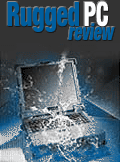|
GETAC F110
A thoroughly convincing, modern rugged Windows tablet that's sleek, light, fast, and easy to use. A+.
(by Conrad H. Blickenstorfer)
On October 15, 2013, Getac introduced what the company says is the thinnest and lightest fully rugged large screen tablet. Translated into numbers, this means a tablet that's just under an inch thick, weighs just over three pounds, carries IP65 sealing, and has an 11.6-inch display. And it's using the latest technology, too. There's a choice of i5 and i7 Haswell processors, and 802.11ac WiFi. If that sounds impressive, it is. Very much.
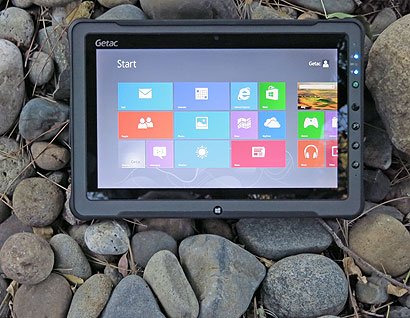
RuggedPCReview had a chance for some hands-on a couple of weeks before this new tablet was officially announced, just enough to form impressions and run our standard benchmarks. What's obvious right off the bat is that Getac cut absolutely no corners. The F110 is not a hastily fortified consumer tablet, nor is it a slimmed-down old-style rugged tablet. Instead, it's a total reinvention of what a tablet for deployment in the field should be, one that can take punishment, and survive bumps and drops and wetness. Yet also one that provides state-of-the-art performance and functionality. Below you can see just how thin and handy this tablet is:
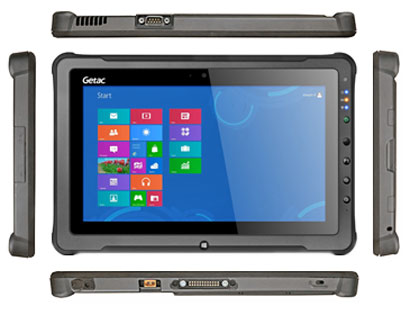
Getac calls the F110 a large screen tablet. That's because its display measures 11.6 inches diagonally. That means a good deal more screen real estate than 10-inch tablets have, and lots more than the increasingly popular 7-inch tablets. How much more? The F110's screen is 21% larger than that of the new Microsoft Surface Pro 2, 29% larger than that of the iPad, and a whopping 2.7 times as large as that of a typical 7-inch tablet. Screen size may not be that important for consumer iOS or Android media tablets, but for a fully rugged Windows tablet it is. For Windows, larger is better in the field, and especially so when you wear gloves or use classic apps and the classic desktop.
The other thing is performance. In the past, the realities of long product cycles and (relatively) low volumes in industrial and vertical markets meant technology was always a generation or two behind. That's less and less acceptable today. And that's why the Getac F110 is based on the absolute latest technology, using Intel "Haswell" 4th generation Core processors. Intel generally claims performance improvements of 10-15% CPU and up to 30% in 3D graphics over a comparable 3rd gen "Ivy Bridge" systems. We put that to the test by comparing the pre-production F110 against the numbers we compiled for what is undoubtedly the new Getac tablet's biggest competitor, the Panasonic Toughpad G1. The table below shows what we found:
|
Getac F110 vs. Panasonic Toughpad G1
|
|
Device
|
Getac F110
|
Panasonic Toughpad G1
|
|
|
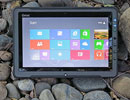
|

|
|
CPU
|
Core i5-4300U
|
Core i5-3437U
|
|
CPU speed
|
1.9/2.9GHz
|
1.9/2.9GHz
|
|
CPU TDP
|
15 watts
|
17 watts
|
|
Graphics
|
HD 4400
|
HD 4000
|
|
Battery
|
48 watt-hours
|
47.5 watt-hours
|
|
Battery life
|
"up to 12 hours"
|
11:00
|
|
Weight (as tested)
|
2.9 lbs.
|
2.25 lbs.
|
|
Display
|
11.6-inch.
|
10.1-inch
|
|
Passmark CPU
|
3,516
|
2,874
|
|
Passmark 2D Graphics
|
489
|
359
|
|
Passmark Memory
|
1,183
|
871
|
|
Passmark Disk
|
3,944
|
4,682
|
|
Passmark 3D Graphics
|
350
|
283
|
|
Passmark Overall
|
2,062
|
1,954
|
|
CrystalMark ALU
|
43,631
|
42,940
|
|
CrystalMark FPU
|
40,249
|
40,683
|
|
CrystalMark MEM
|
30,680
|
38,698
|
|
CrystalMark HDD
|
40,662
|
41,328
|
|
CrystalMark GDI
|
15,019
|
14,451
|
|
CrystalMark D2D
|
6,897
|
1,657
|
|
CrystalMark OGL
|
11,438
|
5,794
|
|
CrystalMark Overall
|
188,576
|
185,551
|
The Panasonic Toughpad G1 is a formidable competitor, but technology absolutely never stands still, and the new Getac F110 has newer technology under the hood. Haswell is slightly more efficient and draws slightly less power under most conditions, it benefits from the new "Lynx Point" companion chipset, and a new GPU architecture with more execution units in the chips available for the F110, and also support for DirectX 11.1, OpenCL 1.2 and OpenGL 4.0. All of this translates into performance advantages that are small in some areas, but quite noticeable in others. And that even with slightly less power draw and a larger display.
Speaking of the display, the F110 comes with a very bright sunlight-readable 800-nit 1,366 x 768 pixel screen, which is a good match when running Windows 8 on an 11.6-inch display—icons, check and scroll boxes, and text are not too tiny in "legacy" desktop mode. Both the Panasonic Toughpad G1 and the Microsoft Surface Pro 2 offer full 1920 x 1080 pixel resolution, and the preliminary specs showed that Getac would have a 1920 x 1080 available, too, but for now that's not on the final spec sheet. As is common in screen technology, Getac has its own special sauces for best possible viewability and contrast outdoors, theirs being QuadraClear (referring to four core elements, those being brightness, anti-reflective coatings, and both linear and circular polarizers) and LumiBond, where display glass is bonded with the touch panel and LCD, minimizing internal reflection.
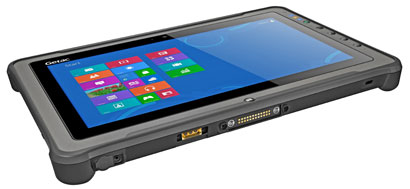
In actual use, the display is very solid, without any flickering, and it is quite sharp. The surface is glossy, which Getac said is because of the protective Gorilla glass. There is a roughly half-inch black bezel area extending beyond the screen perimeter, so that fingers don't bump into anything. Past that, there is the very slightly raised exterior bezel.
Like the V110 convertible notebook introduced at the same time, the F110 tablet has dual batteries. They are recessed into the backside of the device, easily accessible underneath a sturdy milled aluminum cover that snaps into place, and has an o-ring rubber seal to keep water out. The dual battery arrangement means the F110 has hot-swappable power. While Windows 8 boots very quickly on the F110, it's still nice to simply pop in a new battery without having to shut down. The batteries pack a combined 48 watt-hours, which is actually not very much, but Haswell's remarkable power saving technologies allows smaller batteries for a lighter, thinner design without giving up battery life.
In terms of onboard I/O, like most slender tablets, the F110 doesn't have much. You do get audio, a single USB 3.0 port, and a legacy RS232 DB9 port on top of the device. At the bottom is a triple antenna pass-through, a docking port, and power. That's it. You do, however, get the choice of the serial port our unit had, or a second USB port, a MicroSD card slot, or even a 1D/2D imager barcode reader instead. There are two cameras, a HD webcam facing the user, and an optional 5mp autofocus documentation camera.
For wireless communication, the machine comes with an Intel Dual Band Wireless-AC 7260 802.11ac module, Class 1 Bluetooth V4.0, and optional GOBI 5000 for multi-carrier 4G LTE, and SiRFstarIV GPS with accuracy down to 8 feet. Our V110 preview unit also seemed to have an accelerometer, gyrometer, compass, inclinometer, ambient light, that constantly reported data that could be used in advanced applications. We assume the F110 has the same.
Security is addressed via Intel vPro technology, a TPM 1.2 module, various security software modules, optional RFID, an optional contactless smart card reader, and a slot for the simple but effective Kensington lock.
On the ruggedness side, the F110 tablet can operate between -6° and 140° Fahrenheit (-21° to 60°C). Sealing is at the IP65 standards (completely dustproof and able to handle low-pressure water jets from all directions), and the machine fills MIL-STD-810G testing requirements for humidity, altitude, shock, drop, vibration and others. The tablet is also MIL-STD-461F (electromagnetic interference) ready.
With the F110, Getac offers a thoroughly convincing and technologically advanced Windows tablet whose relatively large 11.6-inch display will be greatly appreciated by many users. It's a thin, compact and powerful design that's streamlined yet configurable. Its light weight belies its substantial ruggedness. There's simple multi-touch operation when using Metro or custom apps, but also an active pen for dealing with the Windows desktop or whenever precision and ink capture is required. The Getac F110 is a Windows tablet for a new era, and a most impressive one at that.
|
|
 Specifications Getac F110 Specifications Getac F110
|
|
Status
|
Added 10/2013
|
|
Form-factor
|
Rugged tablet
|
|
OS
|
Windows 7 Professional, Windows 8 Professional
|
|
Processor
|
Intel Core i7-4600U or Core i5-4300U
|
CPU Speed
|
2.1GHz (up to 3.3GHz with Turbo Boost); 1.9 GHz (up to 2.9GHz with Turbo Boost)
|
|
Chipset
|
"Lynx Point" Mobile Intel 8-Series
|
|
Graphics
|
Intel HD Graphics 4400
|
Standard/Max RAM
|
4GB DDR3, expandable to 8GB
|
Disk/drive
|
128GB or 256GB SATA SSD
|
Optical drive
|
Optional external
|
Card slots
|
Optional micro SD (choice of 1D/2D imager barcode reader, or Serial, or Ethernet, or MicroSD, or 2nd USB 2.0 port)
|
Display type
|
TFT LCD; optional QuadraClear sunlight readable TFT LCD, 800 nits
|
Display size/res
|
11.6-inch/1366 x 768 pixel HD
|
Digitizer/pens
|
Multi-touch
|
Keyboard/scale
|
Onscreen or external USB/BT keyboard
|
Sealing
|
IP65
|
Drop
|
MIL-STD-810G
|
Temperature
|
-6° to 140°F (-21° to 60°C)
|
EMI
|
Optional MIL-STD-461F
|
Salt fog
|
No
|
Housing
|
Magnesium alloy, sealed ports
|
Size (WxHxD)
|
12.4 x 8.15 x 0.96 inches (314 x 207 x 24.5 mm)
|
Weight
|
Starting at 3.08 lbs. (1.39 kg.); 3.2 lbs. as tested
|
Power
|
Dual 11.4V 2,160mAh 24 watt-hour Li-Ion ("up to 12 hours"), hot-swappable
|
Interface
|
1 x USB 3.0, 1 x headphone out/mic-in, dock, opt. 1 x HDMI, RF antenna pass-through for GPS, WLAN, WWAN; Choice of 1D/2D imager barcode reader, or Serial, or Ethernet, or MicroSD, or 2nd USB 2.0 port
|
Communications
|
Intel Dual Band Wireless-AC 7260 802.11ac, Bluetooth 4.0 class 1; optional Gobi 4G LTE, SiRFstarIV GPS
|
List price
|
Inquire
|
Contact
|
us.getac.com
|
Web page
|
Getac F110 page
|
Brochure
|
 Getac F110 Getac F110
|
Warranty
|
3-year bumper-to-bumper warranty standard
|
|
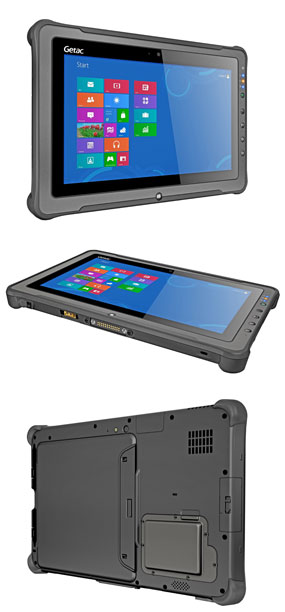
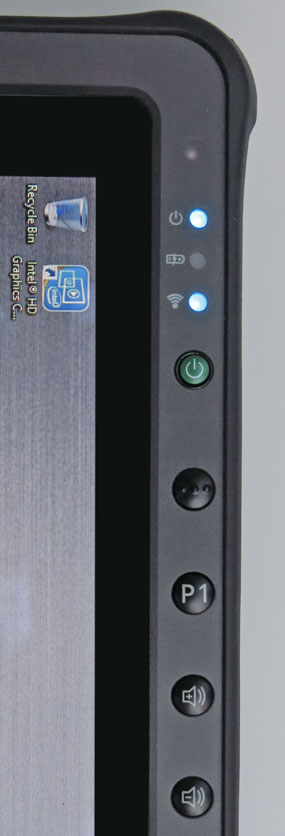
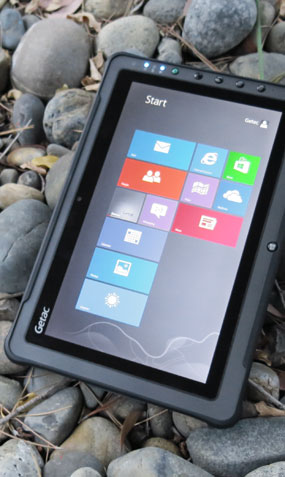
|
|
Getac US Sales Contact:
Getac US Office
Getac Inc.
Tel: +1-949-681-2900
Email: GetacSales_US@getac.com
|
|
|
|
